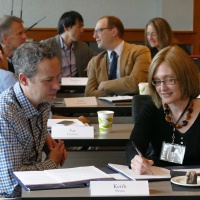Tobin Convenes Scholars for Conference on Inequality and Decision Making

On April 26th and 27th, the Tobin Project hosted a Conference on Inequality and Decision Making, convening forty-seven scholars of psychology, sociology, economics, and other fields to investigate the impacts of high and/or rising economic inequality on individuals’ behavior. By studying how inequality affects individuals’ behavior and decision making, we hope to gain insight into some of the mechanisms through which inequality may have large-scale economic, social, and political outcomes.
The conference featured six interdisciplinary panel discussions that explored a range of topics within the study of inequality. The panels, each composed of four leading academics, sought to establish the state of scholarship in different fields and build on existing research to identify the most important unanswered questions in each area, including:
- How do people become aware of high and rising economic inequality, and how do these cues shape their sense of their own relative status?
- When individuals make comparisons between their own economic status and those of others, to whom do they compare themselves? How do these comparisons influence different forms of subjective well-being?
- How does economic inequality change individuals’ attitudes and biases toward those in their “in-group” and those in “out-groups”? Do inequality’s effects on group dynamics mediate individuals’ political responses to inequality?
- What kinds of psychological responses do people at or near the top-end of the economic distribution exhibit as inequality rises, and how do such responses alter the behaviors of those at the top-end, both in their daily lives and in larger societal contexts?
- How do the degree and visibility of inequality within the workplace affect employees’ satisfaction, performance, and sociability with others?
- What are the different pathways by which inequality may enter the body and affect population health, such as by increasing stress or one’s tendency to engage in risky health behaviors? Do different experiences of economic inequality result in different health outcomes?
The conference also featured a keynote address by Jason Furman, the Chairman of the Council of Economic Advisers from August 2013 to January 2017, who drew on his experiences in the White House to offer a policymaker’s perspective on the importance of understanding inequality and its consequences. In addition, the event included a roundtable discussion on the outstanding research conducted by Orestes Patterson Hastings and Daniel Schneider, who won the Tobin Project’s 2018 Prize for Exemplary Work on Inequality and Decision Making.
The Tobin Project is especially grateful to the members of our Conference Advisory Board, who worked with Tobin to develop and plan the meeting:
- Serena Chen (Professor and Vice Chair of Psychology and the Marian E. and Daniel E. Koshland, Jr. Distinguished Chair for Innovative Teaching and Research, University of California, Berkeley)
- Wendy Berry Mendes (Sarlo/Ekman Endowed Chair in the Study of Human Emotion and Professor of Psychiatry, University of California, San Francisco)
- David Moss (Paul Whiton Cherington Professor, Harvard Business School; Founder of the Tobin Project)
- Michael Norton (Harold M. Brierley Professor of Business Administration, Harvard Business School)
We thank them and all the conference panelists and participants for their meaningful contributions to the event and for their remarkable work towards advancing our understanding of how rising inequality affects American society.

